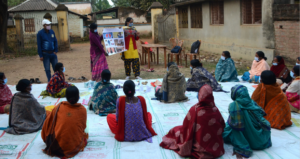Summary of Year 3
 During fiscal year (FY) 2021, ILRG continued to launch new activities in Madagascar, Malawi, Liberia, and DRC, as well as deepen work on women’s land rights and economic empowerment. Progress continued to be stalled in every country due to coronavirus disease 2019 (COVID-19) and associated international travel and local activity restrictions.
During fiscal year (FY) 2021, ILRG continued to launch new activities in Madagascar, Malawi, Liberia, and DRC, as well as deepen work on women’s land rights and economic empowerment. Progress continued to be stalled in every country due to coronavirus disease 2019 (COVID-19) and associated international travel and local activity restrictions.
Nevertheless, there were substantial achievements in FY 2021: rights documentation processes continued in Ghana, Zambia, and Mozambique and were launched in Liberia and Malawi. Women’s land
rights activities were a major focus, and ILRG launched impactful work related to social norms change and women’s representation in land and resource governance bodies. Private sector partnerships were implemented in Mozambique with Grupo Madal and Green Resources SA. A second season of partnership with PepsiCo on WEE in the potato supply chain in West Bengal was completed successfully, with further engagement on PepsiCo’s long-term strategy. The long-standing partnership in Ghana with Hershey and Ecom Agroindustrial Corp. (ECOM) evolved into a novel payment for ecosystem services (PES) pilot. ILRG’s work with ECOM in Ghana will further explore WEE integration into the cocoa supply chain.
In Zambia, the National Lands Policy was approved with recognition of USAID’s substantial support. In
Mozambique, ILRG partnered with the National Land Commission to carry out broad surveys on the Land Law and policy. ILRG’s engagement in Malawi is primarily through government, as ILRG navigates the first large-scale implementation of the country’s new land laws. In Ghana, ILRG’s support on tree tenure remains its primary policy contribution, and in India, ILRG’s experience on land leasing in West Bengal continues to influence the state’s leasing policy. Finally in Liberia, ILRG’s engagements with the Land Commission have helped to navigate the community land deed registration process. Capacity building activities focused on gender integration in all countries, particularly around community natural resource governance in Zambia with five civil society and one private sector partner and their beneficiaries. In Madagascar, ILRG found an important role in stimulating private sector, civil society, and government awareness of land governance issues in the Sambirano Valley that ILRG will continue for the coming years.
ILRG also successfully carried out a large data collection process in Colombia to inform the Prindex
initiative. Activities in DRC related to conflict minerals and responsible sourcing were successfully launched and coordinated with the mission. Finally, in Mozambique activities related to disaster preparedness were launched in Sofala Province in response to both the conflict in Cabo Delgado and the impacts of frequent cyclones. ILRG’s portfolio has been reviewed for its ability to contribute to climate change mitigation and adaptation goals.
Priorities for FY 2022 include making significant progress in Malawi on customary land documentation and in Ghana with WEE through a partnership with ECOM. Further launching of field work for the disaster risk reduction pilots in Mozambique is also a major operational priority. As ILRG looks to its final two years, it is seeking to ensure that all country activities complete their implementation and impacts, and that learning opportunities are fully captured, particularly as they relate to WEE, private sector engagement, land rights documentation, community governance and natural resource management, and responsible sourcing of minerals.

